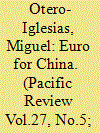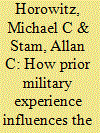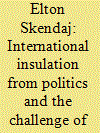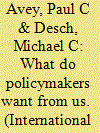| Srl | Item |
| 1 |
ID:
135075


|
|
|
|
|
| Summary/Abstract |
The aim of this paper is to analyze China's strategy in relation to the euro. The first section summarizes China's active support to the single currency since its creation up to the first phase of the current Eurozone debt crisis. It shows how China has used a two-pronged approach. It has developed a public campaign in favor of the euro, especially when the market sentiment has been bearish on the single currency, and it has continued to be an active player in the European sovereign debt markets. The second part explains why China has been so supportive. Beijing wants to move away from dollar hegemony and thus it favors a tripolar monetary system based on the US dollar, the euro and the Chinese renminbi (RMB). With this aim, and despite the crisis, China has continued to diversify its foreign reserves into the euro making it by now ‘too important to fail’, not only because China holds roughly $1 trillion in euro-denominated assets, but also because for China the Eurozone is a crucial market and an important strategic counterweight to US dominance in world affairs. Finally, the third part focuses on how by the end of 2011 China switches to a more cautious approach due to the difficulty involved in rescuing the Eurozone. Domestic pressures, public outcry in Europe against being saved by China, the unwillingness of the European leaders to enter into strategic bargaining and Germany's strategy to use sovereign bond spreads as a market mechanism to create ‘more Europe’ have convinced policy-makers in Beijing to keep a lower profile while making sure the value of the euro remains stable.
|
|
|
|
|
|
|
|
|
|
|
|
|
|
|
|
| 2 |
ID:
133273


|
|
|
|
|
| Publication |
2014.
|
| Summary/Abstract |
Policy-makers and the electorate assume political executives' life experiences affect their policy choices once in office. Recent international relations work on leaders focuses almost entirely on how political institutions shape leaders' choices rather than on leaders' personal attributes and how they influence policy choices. This article focuses the analytic lens on leaders and their personal backgrounds. We theorize that the prior military background of a leader is an important life experience with direct relevance for how leaders evaluate the utility of using military force. We test several propositions employing a new data set, building on Archigos, that encompasses the life background characteristics of more than 2,500 heads of state from 1875 to 2004. The results show that the leaders most likely to initiate militarized disputes and wars are those with prior military service but no combat experience, as well as former rebels.
|
|
|
|
|
|
|
|
|
|
|
|
|
|
|
|
| 3 |
ID:
133481


|
|
|
|
|
| Publication |
2014.
|
| Summary/Abstract |
Can international actors build effective state bureaucracies in postwar countries? While the literature on state institutions suggests they are best built under local ownership, this article shows how international actors in collaboration with local actors managed to build two effective state bureaucracies in postwar Kosovo: the police force and the customs service. Contrary to the article's Hypothesis 1 on local ownership, international actors insulated the effective bureaucracies from political and societal influences in order to prevent them from becoming sites of patronage. Thus, these institutions built on meritocratic recruitment and promotion. Employing a comparative research design, the article utilizes national survey data as well as data from 150 semistructured interviews conducted during ten months of fieldwork in Kosovo. By contrasting the state's constituent bureaucracies, which vary in effectiveness, and thus avoiding the reduction of the state to a unitary abstract actor, this research offers a fresh perspective on postwar state building. Furthermore, it contributes three innovative sets of indicators to measure effective bureaucracies: mission fulfillment, penalization of corruption, and responsiveness to the public.
|
|
|
|
|
|
|
|
|
|
|
|
|
|
|
|
| 4 |
ID:
133642


|
|
|
|
|
| Publication |
2014.
|
| Summary/Abstract |
What do the most senior national security policymakers want from international relations scholars? To answer that question, we administered a unique survey to current and former policymakers to gauge when and how they use academic social science to inform national security decision making. We find that policymakers do regularly follow academic social science research and scholarship on national security affairs, hoping to draw upon its substantive expertise. But our results call into question the direct relevance to policymakers of the most scientific approaches to international relations. And they at best seriously qualify the "trickle down" theory that basic social science research eventually influences policymakers. To be clear, we are not arguing that policymakers never find scholarship based upon the cutting-edge research techniques of social science useful. But policymakers often find contemporary scholarship less-than-helpful when it employs such methods across the board, for their own sake, and without a clear sense of how such scholarship will contribute to policymaking.
|
|
|
|
|
|
|
|
|
|
|
|
|
|
|
|